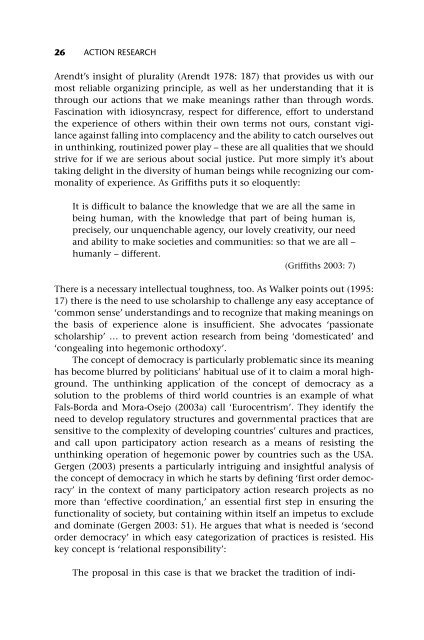Action Research A Methodology for Change and Development
Action Research A Methodology for Change and Development
Action Research A Methodology for Change and Development
Create successful ePaper yourself
Turn your PDF publications into a flip-book with our unique Google optimized e-Paper software.
26 ACTION RESEARCH<br />
Arendt’s insight of plurality (Arendt 1978: 187) that provides us with our<br />
most reliable organizing principle, as well as her underst<strong>and</strong>ing that it is<br />
through our actions that we make meanings rather than through words.<br />
Fascination with idiosyncrasy, respect <strong>for</strong> difference, ef<strong>for</strong>t to underst<strong>and</strong><br />
the experience of others within their own terms not ours, constant vigilance<br />
against falling into complacency <strong>and</strong> the ability to catch ourselves out<br />
in unthinking, routinized power play – these are all qualities that we should<br />
strive <strong>for</strong> if we are serious about social justice. Put more simply it’s about<br />
taking delight in the diversity of human beings while recognizing our commonality<br />
of experience. As Griffiths puts it so eloquently:<br />
It is difficult to balance the knowledge that we are all the same in<br />
being human, with the knowledge that part of being human is,<br />
precisely, our unquenchable agency, our lovely creativity, our need<br />
<strong>and</strong> ability to make societies <strong>and</strong> communities: so that we are all –<br />
humanly – different.<br />
(Griffiths 2003: 7)<br />
There is a necessary intellectual toughness, too. As Walker points out (1995:<br />
17) there is the need to use scholarship to challenge any easy acceptance of<br />
‘common sense’ underst<strong>and</strong>ings <strong>and</strong> to recognize that making meanings on<br />
the basis of experience alone is insufficient. She advocates ‘passionate<br />
scholarship’ … to prevent action research from being ‘domesticated’ <strong>and</strong><br />
‘congealing into hegemonic orthodoxy’.<br />
The concept of democracy is particularly problematic since its meaning<br />
has become blurred by politicians’ habitual use of it to claim a moral highground.<br />
The unthinking application of the concept of democracy as a<br />
solution to the problems of third world countries is an example of what<br />
Fals-Borda <strong>and</strong> Mora-Osejo (2003a) call ‘Eurocentrism’. They identify the<br />
need to develop regulatory structures <strong>and</strong> governmental practices that are<br />
sensitive to the complexity of developing countries’ cultures <strong>and</strong> practices,<br />
<strong>and</strong> call upon participatory action research as a means of resisting the<br />
unthinking operation of hegemonic power by countries such as the USA.<br />
Gergen (2003) presents a particularly intriguing <strong>and</strong> insightful analysis of<br />
the concept of democracy in which he starts by defining ‘first order democracy’<br />
in the context of many participatory action research projects as no<br />
more than ‘effective coordination,’ an essential first step in ensuring the<br />
functionality of society, but containing within itself an impetus to exclude<br />
<strong>and</strong> dominate (Gergen 2003: 51). He argues that what is needed is ‘second<br />
order democracy’ in which easy categorization of practices is resisted. His<br />
key concept is ‘relational responsibility’:<br />
The proposal in this case is that we bracket the tradition of indi-

















